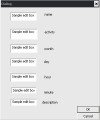Hello, everyone.
I'm trying to learn MFC so I can create GUI's for a few projects I have in mind. I could really use your help with a few basic problems.
I'm attaching a screenshot of my appointment book main window and the other dialog that shows after the ADD button is clicked.
All the windows are ListBoxes at the moment, but that might be wrong. Would just keeping the EVENT window a ListBox and using all the other ones as EditControls be better?
Initially, all the Events will be listed in the Events list. Once an Event is selected, the info associated to it (activity, date, time and description) will be posted in the appropriate EditControls(?) windows.
If a Current Week/day/all/past events radio button is selected, the Events list will contain the appropriate items.
Adding functionalities for the Load/Save button would just complicate things at the moment, so I'll leave that for later.
Thus, my goal for the moment is deciding how to implement all of this. Could I get away with simply using a struct? should I build a class, get() and set() functions, constructors? how would the objects be declared and used? should I make a linked list? I'm trying to get this done as good as possible so I will eventually be able to get a job and do good there.
Deciding on which is best, I will still need more answers on how to properly input data (why should I assign a control variable and not a value one, etc) from the EditControls, store it and then use/display it in other EditControls.
I hope I haven't bored you.
Thanks in advance.


